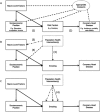Reducing social inequalities in health: the role of simulation modelling in chronic disease epidemiology to evaluate the impact of population health interventions
- PMID: 24363409
- PMCID: PMC3963537
- DOI: 10.1136/jech-2013-202756
Reducing social inequalities in health: the role of simulation modelling in chronic disease epidemiology to evaluate the impact of population health interventions
Abstract
Reducing health inequalities has become a major public health priority internationally. However, how best to achieve this goal is not well understood. Population health intervention research has the potential to address some of this knowledge gap. This review argues that simulation studies can produce unique evidence to build the population health intervention research evidence base on reducing social inequalities in health. To this effect, the advantages of using simulation models over other population health intervention research methods are discussed. Key questions regarding the potential challenges of developing simulation models to investigate population health intervention research on reducing social inequalities in health and the types of population health intervention research questions that can be answered using this methodology are reviewed. We use the example of social inequalities in coronary heart disease to illustrate how simulation models can elucidate the effectiveness of a number of 'what-if' counterfactual population health interventions on reducing social inequalities in coronary heart disease. Simulation models are a flexible, cost-effective, evidence-based research method with the capacity to inform public health policy-makers regarding the implementation of population health interventions to reduce social inequalities in health.
Keywords: Epidemiological methods; Modelling; Public Health Policy; Social Inequalities.
Figures

Similar articles
-
The need for, and value of, a spatial scan statistical tool for tackling social health inequalities.Glob Health Promot. 2017 Dec;24(4):99-102. doi: 10.1177/1757975916656358. Epub 2016 Jul 19. Glob Health Promot. 2017. PMID: 27435081
-
Social inequalities in health: a proper concern of epidemiology.Ann Epidemiol. 2016 Apr;26(4):238-40. doi: 10.1016/j.annepidem.2016.02.003. Epub 2016 Mar 3. Ann Epidemiol. 2016. PMID: 27084546
-
Public health interventions to reduce inequalities: what do we know works?Can J Public Health. 2012 Sep 11;103(7 Suppl 1):eS5-7. doi: 10.1007/BF03404452. Can J Public Health. 2012. PMID: 23618051 Free PMC article.
-
Do multiple community-based interventions on health promotion tackle health inequalities?Int J Equity Health. 2020 Sep 10;19(1):157. doi: 10.1186/s12939-020-01271-8. Int J Equity Health. 2020. PMID: 32912257 Free PMC article.
-
What types of interventions generate inequalities? Evidence from systematic reviews.J Epidemiol Community Health. 2013 Feb;67(2):190-3. doi: 10.1136/jech-2012-201257. Epub 2012 Aug 8. J Epidemiol Community Health. 2013. PMID: 22875078 Review.
Cited by
-
Evolution and Reproducibility of Simulation Modeling in Epidemiology and Health Policy Over Half a Century.Epidemiol Rev. 2022 Jan 14;43(1):166-175. doi: 10.1093/epirev/mxab006. Epidemiol Rev. 2022. PMID: 34505122 Free PMC article. Review.
-
Quantifying the impact of reducing socioeconomic inequalities in modifiable risk factors on mortality and mortality inequalities in South Korea.Int J Public Health. 2019 May;64(4):585-594. doi: 10.1007/s00038-019-01231-2. Epub 2019 Mar 19. Int J Public Health. 2019. PMID: 30887061
-
Informing Investment to Reduce Inequalities: A Modelling Approach.PLoS One. 2016 Aug 3;11(8):e0159256. doi: 10.1371/journal.pone.0159256. eCollection 2016. PLoS One. 2016. PMID: 27486857 Free PMC article.
-
Simulations of future cardiometabolic disease and life expectancy under counterfactual obesity reduction scenarios.Prev Med Rep. 2020 Jun 18;19:101150. doi: 10.1016/j.pmedr.2020.101150. eCollection 2020 Sep. Prev Med Rep. 2020. PMID: 32685361 Free PMC article.
-
Socioeconomic inequalities in obesity: modelling future trends in Australia.BMJ Open. 2019 Mar 30;9(3):e026525. doi: 10.1136/bmjopen-2018-026525. BMJ Open. 2019. PMID: 30928953 Free PMC article.
References
-
- World Health Organization. 2008. Commission on Social Determinants of Health: final report. http://www.who.int/social_determinants/thecommission/finalreport/en/inde... (accessed 26 Jul 2011)
-
- Petticrew M. ‘More research needed’: plugging gaps in the evidence base on health inequalities. Eur J Public Health 2007;17:411–13 - PubMed
-
- Edwards N, Di Ruggiero E. Exploring which context matters in the study of health inequities and their mitigation. Scand J Public Health 2011;39:43–9 - PubMed
Publication types
MeSH terms
Grants and funding
LinkOut - more resources
Full Text Sources
Other Literature Sources
Medical
Miscellaneous
